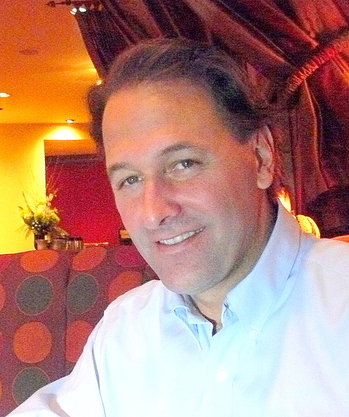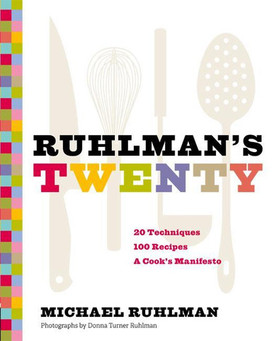In the beginning, there was the Deity, Julia herself, who cooked upon the earth and saw that it was good. Now come the Apostles: St. Michael (Pollan), Mark (Bittman), St. Bill (Buford), and another Michael (Ruhlman), even Uncle Harold (McGee), all journalists who spread the Gospel of Good Food.
 Ruhlman, the boysih author of ruhlman.com, is one of the country's leading food philosophers, with a single, simple message: the world would be a better place if you were to cook your own food. Bittman, at NYTimes.com, may have a bigger platform, Pollan has a catchier business card ("Eat Real Food"), McGee's been around longer, but Ruhlman's got the science of food (as well as its basic message) down to a science.
Ruhlman, the boysih author of ruhlman.com, is one of the country's leading food philosophers, with a single, simple message: the world would be a better place if you were to cook your own food. Bittman, at NYTimes.com, may have a bigger platform, Pollan has a catchier business card ("Eat Real Food"), McGee's been around longer, but Ruhlman's got the science of food (as well as its basic message) down to a science.
Ruhlman became a cook by attending the Culinary Institute of America in order to write "The Making of a Chef." Since then, starting with "The French Laundry Cookbook," he's written a string of culinary standards that mix theory and practice ("The Soul of a Chef," "The Elements of Cooking," "Ratio"). And he keeps writing turning out books about esoteric, non-culinary subjects like wooden boats and pediatric surgery. The defining moment in his career? He tried to cancel attending a béchamel class at the CIA because of bad weather in upstate New York; his mentor pointed out that a real chef wouldn't be fazed by the blizzard. Furious, Ruhlman drove through the snowstorm and showed up for class. "I became a chef out of anger," he admits.
 The latest volume is called "Ruhlman's Twenty." It breaks cooking down into a series of techniques, starting with the most fundamental of fundamentals: Think.
The latest volume is called "Ruhlman's Twenty." It breaks cooking down into a series of techniques, starting with the most fundamental of fundamentals: Think.
Why? Well, says Ruhlman, if you don't think for yourself, you'll be a slave forever to incomprehensible recipes on index cards. "Recipes are not instruction manuals," Ruhlman writes, "they're like sheet music, written descriptions of acts that are infinitely nuanced."
The second item is Salt, which has become a bugaboo in much of today's nit-picking, self-absorbed, too-delicate-to-eat-real-food society. Then the rest of the culinary basics: water, onions, eggs, butter, doughs and batters, vinaigrettes, sauces, soups, and so on.
As for techniques, Boiling was covered in the Water chapter, so it's on to Sauté, Roast, Braise, Fry, Poach, Grill and Chill. Ruhlman apologizes for including the fundamental technique of making stock in his chapter on water, redeeming himself with separate chapters for soup-making and poaching. Along the way, you get 100 step-by-step recipes, beautifully illustrated with photographs by Ruhlman's wife, Donna Turner. "They're real-life photos, too, not idealized," he says.
Ruhman isn't a stickler for fancy equipment. A couple of good knives, a couple of frying pans, a couple of pots, a blender, a few measuring cups and bowls, an instant-read thermometer. He also sells a set of handy "offset" tasting spoons.on his website, but you don't really need them.
The book is not a perfect bible. Batter and dough are both flour-based and don't need separate chapters. Vinaigrette is nothing more than a sauce. Ruhlman mentions olive oil only as a medium for poaching halibut, yet it's a more popular fat, world-wide, than butter, and no less versatile. That, and Ruhlman's timidity with salting the water for pasta: in my view, it should be the salinity of the sea, three percent, not his timid one percent. There's a passing reference to sous-vide cooking, and nothing at all about "passive cooking," the notion that food cooks perfectly well in the residual heat of the oven or the pasta pot.
Ruhlman was in Seattle this week on a tour to promote his new book, and I had lunch with him at Sazerac. "I left out one important tool," he said over tomato soup and grilled cheese sandwiches. "Micro-organisms. Yeasts. The bacteria that cause fermentation in charcuterie and cheese." He'll catch up on the leftovers with a series of shorter volumes for Chronicle Books, perhaps publishing direct-to-Kindle.
The most important thing: making the world a better place by eating less industrial food and more food cooked at home. "Cooking brings people together, it's less expensive, it's better for our bodies, our families, our animals and our land."
This post updates a preview earlier this week promoting Ruhlman's appearance at a Seattle book signing event. The previous post has been removed.
Leave a comment